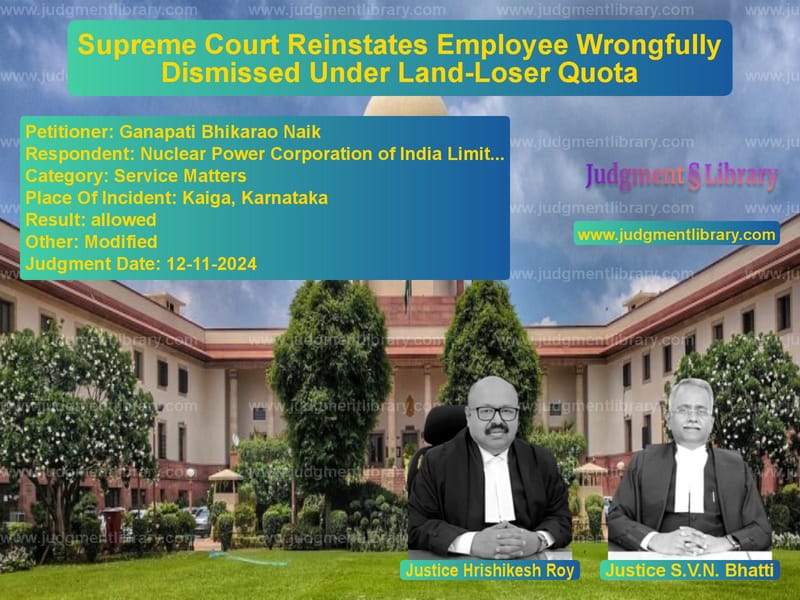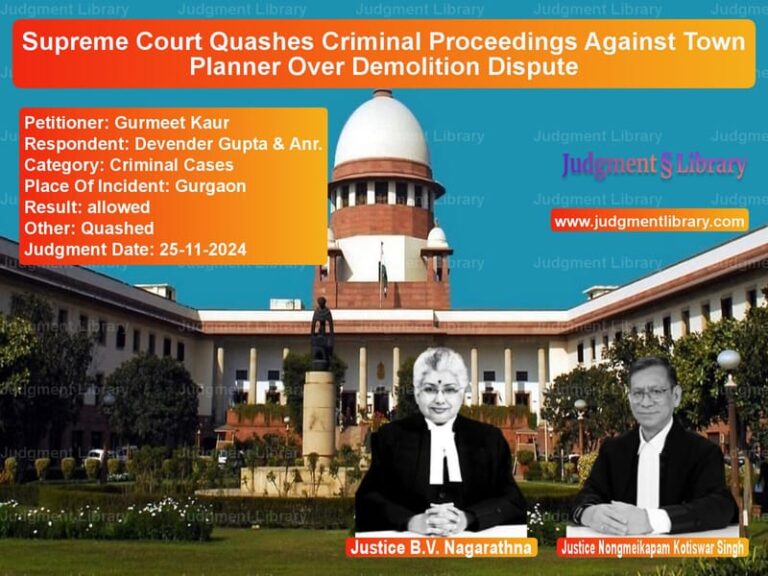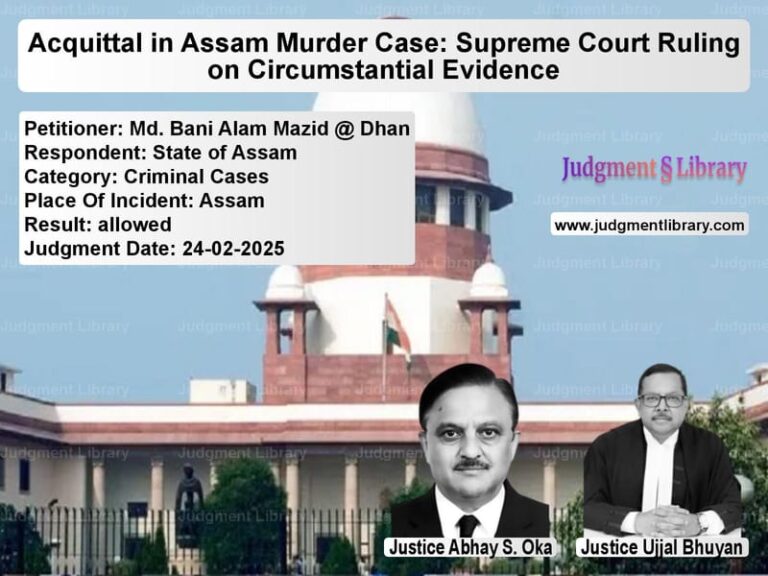Supreme Court Reinstates Employee Wrongfully Dismissed Under Land-Loser Quota
The case of Ganapati Bhikarao Naik vs. Nuclear Power Corporation of India Limited revolves around the wrongful termination of an employee who was appointed under the land-loser rehabilitation scheme. The Supreme Court of India, in its judgment dated November 13, 2024, reinstated the appellant, holding that he was legally entitled to the job and that his dismissal was based on an incorrect interpretation of facts.
Background of the Case
The appellant, Ganapati Bhikarao Naik, was employed as a Helper at the Kaiga Atomic Power Project under the Nuclear Power Corporation of India Limited (NPCIL). He was appointed under the land-loser rehabilitation scheme as the son-in-law of a land-loser, Bellanna Venkanna Gowda. However, after matrimonial disputes and subsequent divorce from his wife, Ganga (the daughter of the land-loser), his employment was questioned and ultimately terminated on April 19, 2002.
The appellant challenged his termination before the Central Government Industrial Tribunal-cum-Labour Court, which ruled in his favor. The Tribunal held that his marriage was valid at the time of appointment and that the land-loser had supported his employment claim. NPCIL, however, challenged this decision before the High Court, which set aside the Tribunal’s ruling, leading to the present appeal before the Supreme Court.
Key Legal Issues
- Whether the appellant’s employment under the land-loser scheme was legally valid despite his subsequent divorce.
- Whether the High Court erred in setting aside the Tribunal’s factual findings.
- Whether the appellant’s dismissal was justified based on claims of misrepresentation.
Petitioner’s Arguments
The appellant contended that:
- At the time of his appointment, he was legally married to the land-loser’s daughter, satisfying the eligibility criteria for the land-loser employment scheme.
- His father-in-law had confirmed his employment under the scheme even after marital disputes arose.
- His employment was terminated unfairly based on his subsequent divorce, which had no bearing on his eligibility at the time of appointment.
- The Tribunal had ruled in his favor after considering all evidence, and the High Court should not have interfered with the factual findings.
Respondent’s Arguments
The respondent, NPCIL, countered with the following points:
- The appellant had secured his job through misrepresentation, as he was no longer married to the land-loser’s daughter at the time of termination.
- The employment scheme was meant for immediate family members of land-losers, and after divorce, the appellant no longer qualified.
- The High Court was correct in setting aside the Tribunal’s ruling, as the appellant had lost his eligibility for the job.
Supreme Court’s Observations
The Supreme Court analyzed the evidence and legal principles involved, making the following key observations:
1. Validity of Employment at the Time of Appointment
The Court emphasized that the appellant’s eligibility for employment should be assessed based on his marital status at the time of appointment, not subsequent events. The judgment stated:
“The appellant had a valid marriage with the land-loser’s daughter when he was appointed. His subsequent divorce cannot retrospectively invalidate his employment.”
2. High Court’s Error in Overruling Tribunal’s Findings
The Supreme Court criticized the High Court for disregarding the factual findings of the Tribunal, stating:
“The Tribunal had thoroughly examined the evidence and found that the appellant was legally married at the time of appointment. The High Court erred in substituting its own conclusions without sufficient justification.”
3. Employer’s Conduct and Procedural Irregularities
The Court observed that the employer had continued to recognize the appellant’s employment even after his marital disputes arose. The judgment noted:
“The employer had initially accepted the appellant’s status as the son-in-law of the land-loser. The termination was driven more by external complaints than by a legitimate reassessment of his eligibility.”
Final Judgment
The Supreme Court ruled in favor of the appellant and ordered:
- The appellant’s termination was illegal and unjustified.
- He was entitled to reinstatement in service within four weeks.
- Back wages were not granted for the period between the High Court’s adverse ruling and reinstatement.
- The period between the High Court’s ruling and reinstatement would be considered for all other service benefits.
Impact of the Judgment
This ruling has significant implications for employment policies under rehabilitation schemes. The decision ensures:
- Employees cannot be dismissed retrospectively based on post-appointment events.
- Tribunal findings should not be lightly overturned by High Courts without compelling reasons.
- Land-loser rehabilitation schemes must be implemented fairly and consistently.
By reinstating the appellant, the Supreme Court has reinforced the principle that employment rights should be determined based on conditions at the time of appointment, providing greater security to employees under similar rehabilitation schemes.
Read also: https://judgmentlibrary.com/supreme-court-rules-against-changing-recruitment-rules-midway/
Petitioner Name: Ganapati Bhikarao Naik.Respondent Name: Nuclear Power Corporation of India Limited.Judgment By: Justice Hrishikesh Roy, Justice S.V.N. Bhatti.Place Of Incident: Kaiga, Karnataka.Judgment Date: 12-11-2024.
Don’t miss out on the full details! Download the complete judgment in PDF format below and gain valuable insights instantly!
Download Judgment: ganapati-bhikarao-na-vs-nuclear-power-corpor-supreme-court-of-india-judgment-dated-12-11-2024.pdf
Directly Download Judgment: Directly download this Judgment
See all petitions in Employment Disputes
See all petitions in Termination Cases
See all petitions in Public Sector Employees
See all petitions in Judgment by Hrishikesh Roy
See all petitions in Judgment by S.V.N. Bhatti
See all petitions in allowed
See all petitions in Modified
See all petitions in supreme court of India judgments November 2024
See all petitions in 2024 judgments
See all posts in Service Matters Category
See all allowed petitions in Service Matters Category
See all Dismissed petitions in Service Matters Category
See all partially allowed petitions in Service Matters Category







